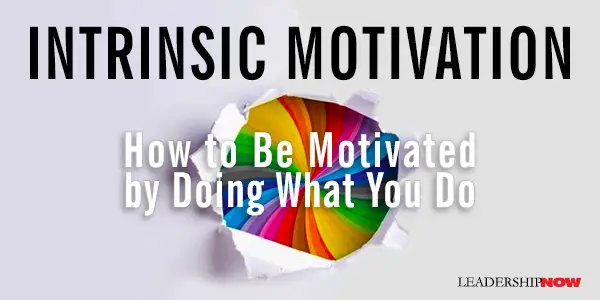 |
 |
02.24.23

Intrinsic Motivation: How to Be Motivated by Doing What You Do
NO MATTER WHAT you are doing, you can be motivated by the work you do. Even if you hate your job, you can learn to love any activity. The key is to create excitement around the experience of doing what you do – intrinsically. It is an inside job. Performance coach Stefan Falk has written Intrinsic Motivation: Learn to Love Your Work and Succeed as Never Before to help you do just that. We can learn to love any activity by rewiring our brains to Focus on Exciting Outcomes or FEOs. The foundation for doing that is found in five success principles that have worked for Falk and others he has shared them with:
The end goal of all of these principles is to cultivate excitement which enables you to love what you do. We sabotage ourselves when we make excuses for not loving our work. The most common excuses are too much to do, too stressed, poor relationships, and unfair performance assessments. There are toxic work environments that reflect on where you work and not why you hate your work. Falk says, “unless you are in an exceptionally bad working environment, in which case you should leave, your excuses are obstacles of your own creation.” So, what’s the answer to this conundrum? The answer is in learning to master your mind. Falk offers “proven step-by-step tools and approaches that will make it easier and less energy-consuming for you to master your mind and to think and act deliberately in your professional life.” To get your head around how to make Exciting Outcome-Focused Behavior or FEOs part of your normal way of operating at work, you need to understand that your work tasks have nothing to do with whether you love them. What makes a work task or activity lovable is how you think about the result you want to achieve. The more exciting that result is to you, the more time you’ll spend thinking about how to best perform that activity. What makes this so difficult to do is that we too often think of work as work and not something we are to enjoy. And we (and our organizations) are activity focused. Organizations thrive on activity-based goals such as “Develop the process for customer complaints,” “Move our data to the cloud,” or “Execute our digital transformation.” The common denominator among almost all company goals is their lack of clear and exciting outcomes. Most professionals are evaluated and rewarded based on whether they have executed an activity and not on what they achieved by doing so. We have the power to think about our work in ways that make it lovable. Every task can be made interesting because every task has endless complexity and can be performed with endless variations. That, of course, requires that we overcome our reluctance to expend energy on deliberate thinking. For example, Falk considers the simple task of asking a colleague for information. We might ask ourselves: • What exactly do I need to know, and how do I express it?
That is certainly intentional thinking. Falk then offers chapters discussing approaches to our work arranged from easy, moderate, and demanding to implement. These include: • Set expectations every day and bring home something exciting and interesting to tell your kids
And many more. Intrinsic motivation happens when you feel challenged. You will need to constantly increase the complexity and challenge of your work. The way you perform your tasks can always be improved, even if you perform them well. To be an intrinsically motivated person, you will need to look for moments when you should be challenging yourself rather than performing on autopilot. No workplace, good or bad, will matter if you haven’t mastered your mind. That said, a good workplace will make it easier to engross yourself in your work. More importantly, you should look for an organization that is “designed to enable its people to experience a sense of autonomy.” 
Posted by Michael McKinney at 07:11 AM
|
BUILD YOUR KNOWLEDGE
 

How to Do Your Start-Up Right STRAIGHT TALK FOR START-UPS 
Grow Your Leadership Skills NEW AND UPCOMING LEADERSHIP BOOKS 
Leadership Minute BITE-SIZE CONCEPTS YOU CAN CHEW ON 
Classic Leadership Books BOOKS TO READ BEFORE YOU LEAD |